
Blog
Notes:
Have you ever wondered why interview processes take longer than they should be? More importantly, how do hiring managers measure the competencies of applicants and successful recruits as objectively as possible?
This episode was made especially for listeners in the middle of the interview and hiring process. John Hodgson, our guest for today, returns to the podcast to shed some light on what happens inside the mind of recruiters.
John is the Owner and Director of Bright Dynamics, a staffing and recruiting company that takes a craft approach to match leaders with professionals specifically for presales. He joins me to discuss how hiring managers determine whether they made a good hire and what adjustments SEs should consider to land their dream job.
Key Takeaways:
- How Joel got into recruiting specifically for sales engineers and presales people
- An assessment model for hiring talent that Joel is working on
- The importance of a hiring survey
- The most important characteristics of talents that hiring managers are looking for from SEs
- What quality of measure or quality of hire is
- The 12 competencies that hiring managers are prioritizing when hiring
- How managers objectively measure competencies
- How managers track competencies across months
- The importance of mentorship during the hiring process
- Why performance review is not an exact science
- John’s recommendation when so many people are brought into the hiring process
- Why coachability is critical for job seekers
- Why long interview processes hurt the hiring companies
- Three options for demoing a product
- The challenge of demoing a customer’s product
- The power stage of the interview
- The benefits of delaying the interview process
Quotes:
We believe the best way to assess is to look to have a number of different approaches, bring all of that data together, and then make a decision from there. — Joel Hodgson
You’re obviously going to want to be measuring the quality of hire as well. Because if you don’t measure that, then there’s no way of knowing where your blind spots are, there’s no way of improving, there’s no way of knowing how effective what you’re doing, what you’re setting out to do. And at the moment, based on the results, 73% don’t do that. — Joel Hodgson
I think, generally speaking, leaders, managers, and high managers have a pretty good idea as to what leads to success. — Joel Hodgson
Hitting quota is not such a good measurement of good sales engineering. — Ramzi Marjaba
One of the things I do when I interview and I look for when I’m interviewing other people is if they’re doing a discovery on me for the job. Maybe because it is a discovery call. I’m trying to discover as much about the interviewee as they’re trying to discover as much about the company and myself. So if they can’t do a discovery and highlight their strengths in the discovery, where they’re the product, how are they going to do it about a product? — Ramzi Marjaba
When you jump on a call and you do something, and they give you feedback, it’s a good time to show that you’re coachable and take their feedback into account while doing the demo. — Ramzi Marjaba
If you’re a hiring manager coachability is really important to understand. It feels a lot more comfortable when you see that somebody’s coachable and that they listen. It’s hard not to be rooting for that individual where you’ve had the conversation beforehand, and you see them kind of playing it out. And that’s the ultimate decision maker. — Joel Hodgson



